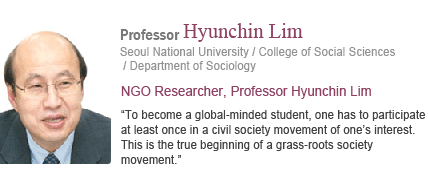
Professor Hyunchin Lim, one of the most prominent scholars in the field of Human Sociology, is indeed an authority on Sociology proved through his comparison studies on the development of Korean society.
Lim is a prolific researcher with more than 20 books and over 150 papers published. In particular, he is renowned for dealing with the subordination and development of Korea in a global viewpoint. His research on the growth of the East Asian society has impressed many foreign universities.
Since the 1990s to January 2008, Professor Lim has gained experience as an exchange professor, a guest professor and an invited research professor at Rikkyo University (Japan), Tsukuba University (Japan), Harvard-Yenching Research Center (USA) and more.
Currently, he is concentrating his efforts on civil society movements and nongovernmental organizations (NGO). According to Lim, revitalizing the global civil society movements is a prerequisite for a more democratic and just world. “While NGOs in developed societies are operated by volunteers and not experts, NGOs in Korea are dominated by permanent experts,” he commented, “The participation of the public is essential to realize the true grass-roots society movements.” Professor Lim spurs his students to by all means take part in NGO activities as he knows that the passion and concerns of youngsters really count.
Furthermore, he has worked on the strengths and weaknesses of an institutional and cultural approach to the development of East Asia. “In order to socially analyze the development process of the Korean society, a very Korean theory order needs to be established first instead of cramming in the Western theories,” stressed Lim. Consequently, he has strived to establish social science theories that acclimate well with the Korean culture. Some of his original theories are ‘The parentless family theory’, where the situation of national division is compared to a parentless family, and ‘The power theory’, which explains the disruption of the Korean society with the intention of accumulating power rather than classes nor ideologies.
He plans on organizing general cases on global organizations concerned with the environment, human rights and anti neo-liberalism over the next five years and publishing them in a book titled ‘Global Civil Society : Theory and Reality’.
February 4th 2008

